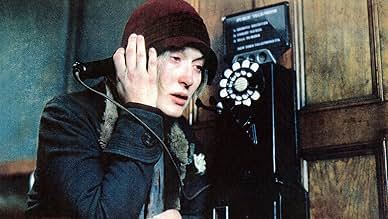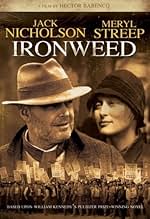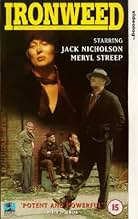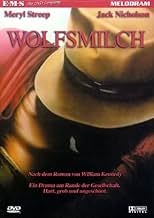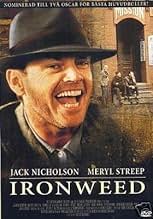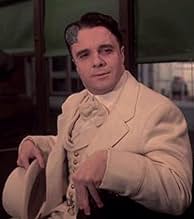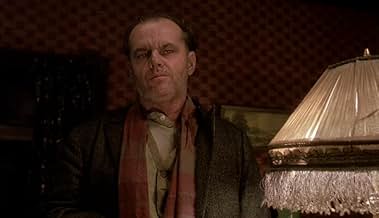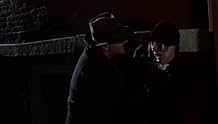An alcoholic drifter spends Halloween in his hometown of Albany, New York after returning there for the first time in decades.An alcoholic drifter spends Halloween in his hometown of Albany, New York after returning there for the first time in decades.An alcoholic drifter spends Halloween in his hometown of Albany, New York after returning there for the first time in decades.
- Nominated for 2 Oscars
- 2 wins & 4 nominations total
- Director
- Writer
- All cast & crew
- Production, box office & more at IMDbPro
6.710.6K
1
2
3
4
5
6
7
8
9
10
Featured reviews
A Good Look At Alcoholism...
I had seen this movie when it first came out, and just seemed hopelessly depressing. Good acting and sets, but a story with little hope for anyone. Recently I re-watched it and have an appreciation for its accurate depiction of alcoholism. I think this story could take place in any decade and have the same outcome. But the fact its in the depression era drives it all home that much harder. Francis (Nicholson) plays a down trodden bum all too familiar with the alleys and soup kitchens of 1938 Albany NY. He has a casual relationship with Helen (Streep) who seems very down on her luck too. If Francis can stay sober for a few days, the kind priest at the mission finds him odd jobs for pay. But soon as Francis works, he drinks again. Helen also is quite a drinker, and the two try to take care of each other finding places to sleep and getting food to eat. Paying attention to the dialog and flashbacks, the viewer learns Francis and Helen had fairly illustrious and gruesome pasts. Francis is prone to seeing many 'ghosts' haunt him still. In a way to confront his past, he returns to his wife and family he had abandoned after a tragedy a few decades earlier. He makes amends as best he can, but redemption seems to get more elusive for him. Not that the film takes any hard stance on alcoholism, but I'd say shows that it's truly an incurable disease that can torture a person to utter hopelessness and still continue. Past accomplishments, future dreams, true love and devotion and loss are all meaningless when there's another drink to be had. So the movie I don't think will either sober a true alcoholic up by watching it - but may help? Nor do I think it will encourage anyone to take up the profession seriously - unless they already have the infliction? But to the good christian that is naive to the vices many of us get addicted to, I think this movie realistically shows the destructive torment and survival alcohol can cause, regardless of success, tragedy, or current blight. Beautifully ugly.
Great chance to see Nicholson and Streep in less glamorous roles.
I found this movie on DVD at my public library, I watched it at home.
The Great Depression in the USA lasted from 1929 to 1939. This movie is set in 1938 Albany, New York, near the end of the Depression but with most communities in a depressed economic state.
Jack Nicholson is Francis Phelan, a drifter who has been away from home for some years. He returns right at Halloween, he meekly looks up his wife and two young adult children, but he calmly states that he doesn't plan to stay.
His friend with benefits for some years is Meryl Streep as Helen, former singer and entertainer who now was a shell of her former self.
In a non-glamorous role Carroll Baker is Francis' faithful wife Annie Phelan, she is surprised when he shows up but treats him with compassion.
This is just a slice of life story, bums and drifters doing what they can to sometimes find a little work, maybe get a sandwich here or visit the soup kitchen there, find an abandoned car to sleep in for the night without freezing.
I didn't find the story itself very enjoyable, it is a tragic story, but I found it worthwhile for Nicholson and Streep.
The Great Depression in the USA lasted from 1929 to 1939. This movie is set in 1938 Albany, New York, near the end of the Depression but with most communities in a depressed economic state.
Jack Nicholson is Francis Phelan, a drifter who has been away from home for some years. He returns right at Halloween, he meekly looks up his wife and two young adult children, but he calmly states that he doesn't plan to stay.
His friend with benefits for some years is Meryl Streep as Helen, former singer and entertainer who now was a shell of her former self.
In a non-glamorous role Carroll Baker is Francis' faithful wife Annie Phelan, she is surprised when he shows up but treats him with compassion.
This is just a slice of life story, bums and drifters doing what they can to sometimes find a little work, maybe get a sandwich here or visit the soup kitchen there, find an abandoned car to sleep in for the night without freezing.
I didn't find the story itself very enjoyable, it is a tragic story, but I found it worthwhile for Nicholson and Streep.
Grim And Wonderful
Cold, desolate in the surface and an uncomfortable warmth in the inside. Meryl Streep leads in a way that is difficult to explain. She provides a truly magic movie moment when she sings "He's My Pal" for her supper. For a moment we live her fantasy. Her moment is our moment, that's why as the song and the fantasy ends something inside me cracked. I felt tears running down my face and, I swear, I wasn't ready for that. The humanity of Meryl Streep, the actress, filters through the devastating circumstances of her character. Circumstances that, by the time we meet her, are already a way of life. At the beginning of the film, when somebody asks her how is she, her reply is "Delightful". Trying to adjust to this character I listen to her stained, tired voice, trying to be heard and I did, heard her. I love Meryl Streep.
The Great/Depressing Depression
Given that we often hear a rather idealized version of the Great Depression - it seems like some people go so far as to treat it as the "good old days" - it's important to understand just what things were like back then. Hector Babenco's ultra-downer "Ironweed" does that. Jack Nicholson plays drifter Francis Phelan, who returns to his home town (where he hasn't been in years) and traipses around it, seeing the poverty prevalent throughout the Depression. He deals with his own demons and sees whether or not he can start up a new life. But he can't escape the reality of the status quo, or of his own past.
Watching this movie, you may feel like you've just been drug through a gutter. But one must wonder how much better things are nowadays. For how terrible the Depression was, it helped our country understand not only abject poverty, but what caused the Depression. In this era of air-heads slacking off and using as many resources as possible, I wonder whether or not we might be headed towards a new kind of Depression. If so, then the movie warned us.
Anyway, I recommend this movie, but understand that it's a total downer. Also starring Meryl Streep, Carroll Baker, Michael O'Keefe, Diane Venora, Fred Gwynne, Tom Waits and Nathan Lane.
Watching this movie, you may feel like you've just been drug through a gutter. But one must wonder how much better things are nowadays. For how terrible the Depression was, it helped our country understand not only abject poverty, but what caused the Depression. In this era of air-heads slacking off and using as many resources as possible, I wonder whether or not we might be headed towards a new kind of Depression. If so, then the movie warned us.
Anyway, I recommend this movie, but understand that it's a total downer. Also starring Meryl Streep, Carroll Baker, Michael O'Keefe, Diane Venora, Fred Gwynne, Tom Waits and Nathan Lane.
They're my pals.
Never the timing for a movie had been so disastrous.Released in those "glorious " eighties when the success stories and the triumphalist heroes were the golden rule,"Ironweed" stood no chance at all.Two tramps did not fit well in the movie landscape of those "feel good" times.And two tramps played by two megastars ,it was unforgivable!
The cast is stellar,but it's Meryl Streep whom I will remember FOREVER.When she sings her little tune "he's me pal" she's so heart-wrenching that she will move you to tears."At least ,I didn't betray anybody" she said.Although it was a colossal flop,Streep would only approach such an emotion afterwards.(notably in "the bridges of Madison County")Nicholson was equally courageous to play such a demeaning part,and he gets strong support from Carroll Baker who proves here she can age gracefully and from Tom Waits ,ideally cast as a barfly.
"Ironweed" is very hard to see nowadays.One of these days ,it will be given the place it deserves.
The cast is stellar,but it's Meryl Streep whom I will remember FOREVER.When she sings her little tune "he's me pal" she's so heart-wrenching that she will move you to tears."At least ,I didn't betray anybody" she said.Although it was a colossal flop,Streep would only approach such an emotion afterwards.(notably in "the bridges of Madison County")Nicholson was equally courageous to play such a demeaning part,and he gets strong support from Carroll Baker who proves here she can age gracefully and from Tom Waits ,ideally cast as a barfly.
"Ironweed" is very hard to see nowadays.One of these days ,it will be given the place it deserves.
Did you know
- TriviaArgentinean director Hector Babenco said of this picture: "It is a movie that tries to embrace the territories of love, and it's also about the courage and beauty of people we don't usually think of as having deep and complex emotions."
- GoofsAs the trolley being driven by the scab played by Nathan Lane approaches the union protesters, there are no trolley tracks between the mob and the trolley. In the next shot, they suddenly appear in the dirt under young Francis' feet.
- SoundtracksWhe You Were Sweet Sixteen
Words and Music by James Thornton
- How long is Ironweed?Powered by Alexa
Details
Box office
- Budget
- $27,000,000 (estimated)
- Gross US & Canada
- $7,393,346
- Opening weekend US & Canada
- $36,973
- Dec 20, 1987
- Gross worldwide
- $7,393,346
- Runtime
- 2h 23m(143 min)
- Color
- Sound mix
- Aspect ratio
- 1.85 : 1
Contribute to this page
Suggest an edit or add missing content


